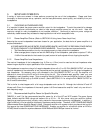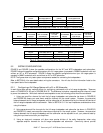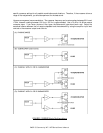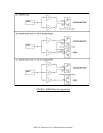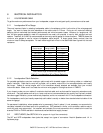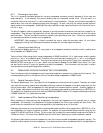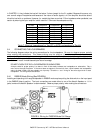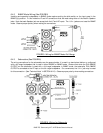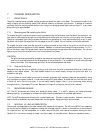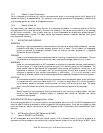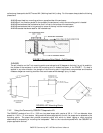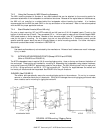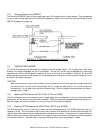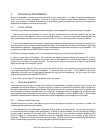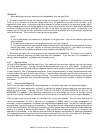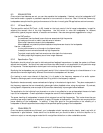PAGE
24
Community XLT / XLTE Series Owner’s Manual
7 PHYSICAL INSTALLATION
7.1 FRONT GRILLE
The grille is painted using a powder coating process that bonds the paint to the steel. This prevents the paint from
easily chipping and the resulting matte finish reduces reflection of ambient light sources. If desired for cosmetic
purposes, the grille may be painted another color using a non-bridging enamel paint such as Krylon™. In any case,
spray painting is recommended.
7.1.1 Removing and Re-installing the Grille
To remove the grille, unscrew the small mounting screws pulling the grille away from the face of the enclosure. You
may have to hook the grille through one of the perforations with a small tool to aid in pulling it away from its recess.
The grille is purposely tight fitting to prevent the metal from resonating so it may require some force to pull it away.
Be careful not to catch the carpet pile with the edges on the XLT models. Do not loose any of the grille standsoffs
To reinstall the grille, make sure that the grille is correctly oriented so that holes in the grille line up with all of the
standoffs that should be positioned in their recesses. Refasten it to the enclosure using the original screws: 1-1/2 in. /
38 mm #6 sheet- metal, Phillips pan-head. Insure that the screws go through rather than around them. Do not over
tighten as you may strip the screw hole in the front enclosure front panel.
CAUTION:
The grille has sharp points along its edge so use care when handling the grille edges to avoid injury. The grille is
shear-cut to size and because of the arrangement of the perforations, it is impossible to avoid cutting through
some of the holes. This makes sharp points out of the land area between the holes.
7.1.2 Custom Grille Cloth
Because of the way the grille is retained, putting a grille cloth over the grille is somewhat difficult as it could cover
access to the retainer screws. The most feasible method is to screw directly through the grille cloth after it is
installed on the grille.
If you do choose to use a custom grille cloth for cosmetic purposes, high frequency losses can be avoided by using
only a synthetic (inorganic) material. It must have at least a 50% open weave. A simple test is to hold the cloth about
4 inches (10 cm) in front of your eyes. If you can easily identify objects 3 feet (1 m) or more away when looking
through the cloth, it is probably OK to use. Because of the tight fit of the grille, use only a thin material.
7.2 ENCLOSURE FINISHES
XLT:
The XLT enclosures are finished with dense-pile black carpet. It is held in place by an industrial-strength
adhesive backing. It is designed to withstand the typical handling associated with portable applications
XLTE:
The XLTE enclosures are finished with a water-based paint. This paint is quite durable. However, should you
need to touch up scratches, any water-based paint may be applied. Spray painting is recommended.
7.3 MODEL 41, 42, AND 46 ORIENTATION
The nominal coverage patterns for these models is 90 degrees by 40 degrees. The HF horns (MF/HF horn assembly
for the 46) can be rotated by 90 degrees to change the coverage pattern in relation to the position of the enclosure.
To rotate the horn, lay the loudspeaker on its back, remove the grille, and unscrew the screws holding the horn.
Carefully lift it out the horn enough to rotate it and then reseat it in the baffle cutout. Be sure to replace all screws.



